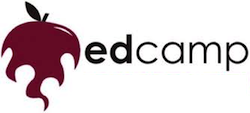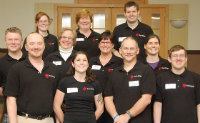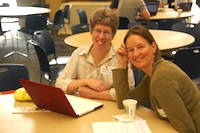EdCamp: Do It Yourself PD
It’s face to face, school- or district- or region-wide, sometimes wi-fi’d, and always free. EdCamp is do-it-yourself professional development with sessions led by attendees after lots of planning by volunteers. And it’s popular.
This version of the unconference started after several Philadelphia area educators met at BarCamp Philly (an open-format computing conference) in 2009 and saw the potential for educators. Dr. Kristen Swanson, one of those early adaptors, described EdCamp’s origin and its power at TEDxPhiladelphiaED in 2011, a year after the first EdCamp Philly.

Jarrett also emphasized that he and other EdCamp advocates are not saying that edcamp-style PD should be the only professional learning experiences available in a school or district. He wrote:
There are plenty of topics that require outside expertise to be brought into a school. Well-respected, experienced experts can do much to help processionals hone the skills they need to be effective in the classroom. But for many, and for too long, that has been the ONLY FOCUS OF DISTRICT PD. And, all too often, those well-respected, experienced experts fail to engage their audiences. The result? Where we are today. It’s time for a change. It’s time for your district to consider putting the learners – in this case, the teachers – first.”
As a follow-up to the presentation, Swanson created a Storify post, #edcamp Hits ASCD, which includes tweeted links, photos and videos on how to run an EdCamp — plus suggestions from Nicholas Provenzano, Edcamp Detroit organizer, and Karen Blumberg, Edcamp NYC organizer.
For background on EdCamps, read Mary Beth Hertz’s 2010 series of posts for Edutopia. Hertz, another EdCamp Philly organizer, explains what EdCamps have borrowed from BarCamps, describes how participants come together to suggest topics and volunteer to lead sessions, and outlines the tasks of planning an EdCamp and finding minimal funding if needed. Elementary principal Peter DeWitt asks and answers questions about the how and why of producing EdCamps in a post at his Finding Common Ground blog at Ed Week.
M.E. Steele-Pierce, an assistant district superintendent in Ohio, captured the revolutionary excitement of teachers creating their own professional learning in a 2011 post at Voices from the Learning Revolution. She wrote, “I call it magic. But magic it’s not: it’s what creation and collaboration look like as you watch the process unfold before your eyes. It looks like magic because as adults we are so unused to seeing democratic, generative thinking, live, in action.” In addition to laying out the strengths of EdCamps for adult learners, Steele-Pierce also introduced TeachMeet, a British unconference model that features more pre-planning to recruit presenters for brief sessions.
Writing in the Harvard Education Letter, Ed Week blogger Justin Reich and Edcamp Foundation chair and educator Dan Callahan described the EdCamp phenomenon. With the many EdCamps in the years since EdCamp Philly, hundreds of teachers have enthusiastically shared their ideas and expertise on a wide range of topics, on Saturdays or district PD days. The HEL article encourages session facilitators to use interactive methods with plenty of opportunity for discussion. Because educators are meeting with others from their schools or districts, they can concentrate on local concerns. Using the Rule of Two Feet, teachers can move from one session to another to capture as many thoughts as possible. Tweeting is rampant.
In November, 2014, the Edcamp Foundation hired its first executive director, veteran educator Hadley Ferguson. The 501(c)3 foundation works to “promote organic, participant-driven professional development for K-12 educators worldwide.” In addition to providing guidelines, blog posts, and breaking news, the Foundation links to the Edcamp Wiki. There you will find the actual websites of EdCamps past and present, along with even more ideas for creating an EdCamp.
New is 2015 is the Foundation’s Edcamp-in-a-Box filled with items and information to help organizers get started. Plans are to award the boxes, sponsored by a range of companies that have supported Edcamps in the past, to several edcamps annually.
Edcamp Leadership 2015 spred across the US (and Chile) to welcome hundreds of school leaders in July. To watch for plans of Edcamp Leadership 2016, go to #edcampldr.
Traditional PD and edcamps have different goals, as Kevin Jarrett suggests above. Some view edcamps as superficial events led by well-intentioned but inexpert people. In a series of posts at his blog, ReconstructEd, science teacher and Edcamp co-founder Mike Ritzius references critics and then outlines a continuum of PD for educators: “The goals of the PD offering should determine the format. Explicit knowledge – traditional is more effective; tacit knowledge – edcamp is more effective; continuity of message – traditional; continuity of practice – edcamp; introducing an initiative – traditional; bringing an initiative to maturity – edcamp. Both edcamp and traditional methods have merits, but pair them together and truly effective professional development will be achieved.”
More resources:
What Makes EdCamps Popular with Teachers? (Tom Whitby, SmartBlog on Education, 10/30/12)
EdCamp Organizer Checklist (Google Doc started by C. McGee – additions & tweaks invited – 11/4/12)
_____
Photo 1: at Kristen Swanson’s blog, Teachers as Technology Trailblazers. Pictured: Nicloae Borota, Mary Beth Hertz, Kevin Jarrett, Rob Rowe, Mike Ritztus, Hadley Ferguson, Ann Leaness, Kristen Swanson, Christine Miles, Kim Sivick, Dan Callahan
Photo 2 and category frontpage: by Kevin Jarrett at Tech & Learning






































Please add any helpful resources we missed – here in the comments!
Thanks for the amazingly complete post! Go #edcamp!